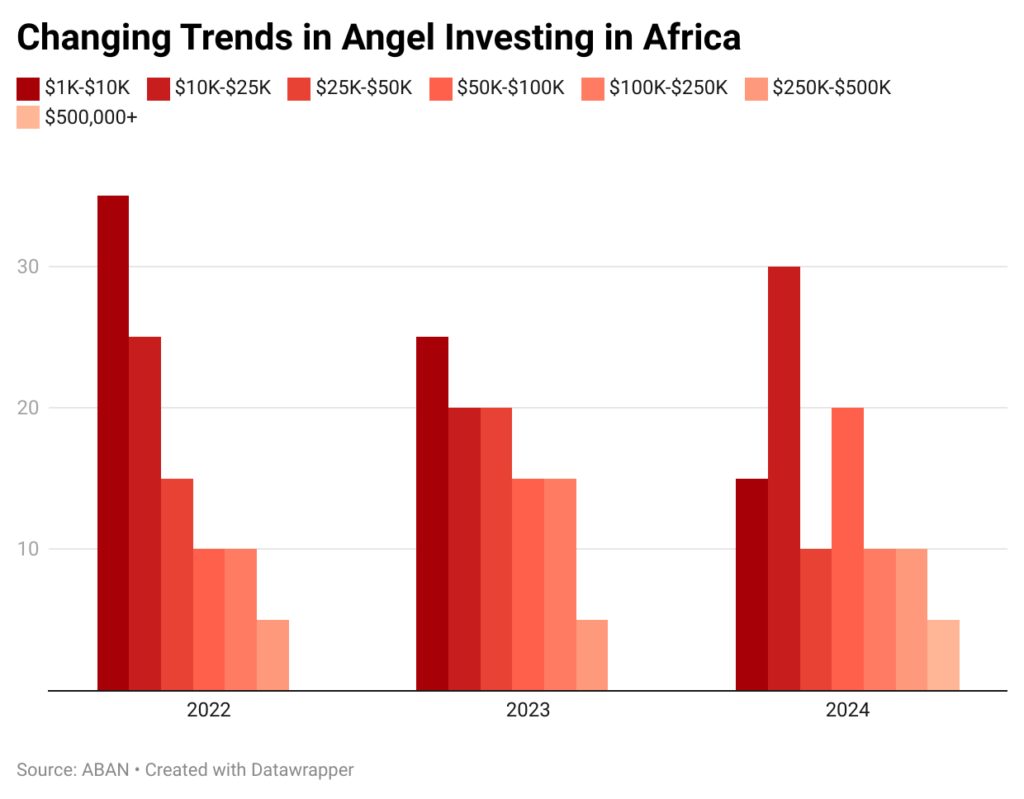A recent report by the African Business Angel Network (ABAN) reveals that 77% of African angel investors have invested less than $25,000 in startups between 2022 and 2024. The finding points to a cautious, risk-averse approach among investors in the continent’s startup ecosystem.
The report, based on a survey of over 110 angel investors who have backed African startups, highlights key trends in early-stage funding. Data was also gathered through ABAN’s collaboration with Briter, a business analytics platform focused on startup funding.
While most angel investments remain below the $25,000 mark, the report indicates that the share of angel investors committing between $50,001 and $250,000 has been growing steadily. However, no specific figure was provided for this trend.

Angel investment plays a critical role in financing early-stage startups, especially in markets where access to venture capital can be limited. However, the high-risk nature of these investments—often in unproven business models—leads to hesitancy. Despite these challenges, startups require funding to scale and unlock their potential for significant growth. The report suggests that increased education and access to better data could help investors make more informed decisions and mitigate perceived risks.
Investment instruments: Risk appetite and preferences
The report also shows African angel investors’ varied approaches, depending on their risk tolerance and investment goals. Half of those surveyed opt for equity investments via Simple Agreements for Future Equity (SAFE), a tool typically used by risk-tolerant investors who hope for high returns in the long run.
Meanwhile, 28% of angel investors prefer debt instruments, such as convertible notes or loans. These options offer quicker returns and shorter timelines, appealing to more risk-averse investors looking for a faster payoff without completely forgoing a stake in early-stage ventures.
Shift toward structured investment vehicles
The angel investing landscape in Africa is evolving from individual investors making decisions based on personal connections to more collaborative approaches. 46% of the surveyed angels now prefer investing through structured vehicles like angel syndicates, which allow for shared risk, pooled resources, and access to a broader deal flow. An additional 28% use a flexible mix of individual and collective strategies, while 26% prefer to invest independently.
Maha Mandour, CEO of COREangels MEA, underscores the importance of a methodical approach: “Scouting and filtering startups, coupled with thorough due diligence, is key to achieving better returns in angel investing.”
A strong sense of purpose drives investment
Angel investors in Africa are often driven by more than just financial returns. The ABAN report highlights that 59% of respondents are motivated by the potential for job creation and poverty reduction in Africa, while 19% focus on empowering youth and women through their investments. A smaller but significant 10% prioritize funding for climate solutions.
The report also sheds light on the growing preference for technology-driven startups. 42% of investors are particularly drawn to ventures that leverage technological innovation, a trend that mirrors the broader venture capital landscape where tech-centric sectors like fintech, e-commerce, and energy continue to attract the bulk of funding. Venture capitalists invested over $1.8 billion in these sectors in 2024 alone.
However, many angel investors maintain diversified portfolios. Around 25% of respondents indicate a sector-agnostic approach, showing a wide-ranging interest in industries across the African continent, from agriculture to healthcare and beyond.
Between 2008 and 2023, angel investors have collectively invested $35 million into African startups. As the sector matures, more angel networks are emerging to support investors, offer training, and provide better access to data. This evolution is helping to demystify angel investing, expand investor reach, and improve decision-making.
While the African angel investment sector is evolving and growing, the report stresses the importance of education and data-driven decision-making to foster greater confidence and larger investments in the future. Given the risks, the current cautious approach is understandable, but increased knowledge and network building could pave the way for a more vibrant angel investment ecosystem across the continent.
Comments
Post a Comment